Hitchcock Characters

Hitchcock
Cast: Anthony Hopkins, Helen Mirren, Scarlett Johansson, James D'Arcy, Jessica Biel, Michael Stuhlbarg, Toni Collette, Michael Wincott, Kurtwood Smith, Richard Portnow, Danny HustonDirector: Sacha Gervasi
Genre: Biography, Drama
Rated: M
Running Time: 99 minutes
Synopsis: Hitchcock is a love story about one of the most influential filmmakers of the last century, Alfred Hitchcock and his wife and partner Alma Reville. The film takes place during the making of Hitchcock's seminal movie Psycho.
Release Date: January 10th, 2013
"The Hitchcock touch had four hands and two of them were Alma's."- Film Critic Charles Champlin
Lurking behind Alfred Hitchcock, cinema's "master of suspense" - the extraordinary film icon known for orchestrating some of the most intense experiences of menace and intrigue audiences have ever seen, was a hidden side: his creatively explosive romance with his steadfast wife and filmmaking collaborator, Alma Reville.
Now, for the first time, Sacha Gervasi's Hitchcock lays bare their captivating and complex love story. It does so through the sly, shadowy lens of their most daring filmmaking adventure: the making of the spine-tingling 1960 thriller, Psycho, which would become the director's most controversial and legendary film. When the tumultuous, against-the-odds production was over, nothing about movies would ever be the same - but few realised that it took two to pull it off.
Sacha Gervasi and a cast that includes Academy Award® winners Anthony Hopkins and Helen Mirren starring as Alfred and Alma spin a story rife with surprises, comic ironies and dark twists in the Hitchockian tradition. But at the heart of the film lies not only the obsessions and fears of two people but the distinctively tenacious love that drove Hitchcock's art behind the curtain.
"I beg permission to mention by name only four people who have given me the most affection, appreciation, encouragement, and constant collaboration. The first of the four is a film editor, the second is a scriptwriter, the third is the mother of my daughter Pat [Patricia Hitchcock], and the fourth is as fine a cook as ever performed miracles in a domestic kitchen. And their names are Alma Reville." - Alfred Hitchcock
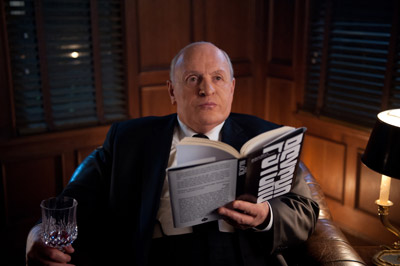 Alfred
AlfredTo play perhaps the most instantly recognisable filmmaker of all time, the team behind Hitchcock thought there was no one better for the job than Academy Award winner Anthony Hopkins. Anthony Hopkins is perhaps best known for his own unforgettably dark turn as a manipulative psychopath, Hannibal Lecter, who helped in the capture of a sophisticated, modern-day relation to Norman Bates, Buffalo Bill, in The Silence Of The Lambs. But his prolific roster of roles - from The Elephant Man and Remains of the Day to NIXON and Shadowlands - reveals a broad versatility to embody the most complex personalities.
"I've always been fascinated by Hitchcock," said Anthony Hopkins. "My first professional job was in the theatre in 1960 in Manchester and I remember going to the movies and Psycho was playing in Manchester. I went to see the movie on a Sunday night in October 1960 and I don't think I've ever been so scared in my life. It was maybe the greatest movie I've seen up to that point in my life. Rear Window and Psycho are my two favourite movies."
Sacha Gervasi notes that he wasn't looking at all for some kind of uncanny physical resemblance to Hitchcock, but rather, for someone who could bring forth something more subtle and vital: the humanity running beneath his well-known genius, quirks and cutting humour. "We didn't want someone to just impersonate Hitchcock, that was important from the beginning," Sacha Gervasi explains. "It was really about revealing the spirit of the man and Anthony Hopkins is a master of doing that with iconic characters, from Richard Nixon to Pablo Picasso to CS Lewis. When you see him as Hitchcock, it takes a moment to adjust to it, but his power as an actor is so deep that, within a few sentences, you become completely embedded in Tony Hopkins' version of Hitchcock. There are very few actors in the world capable of doing that. He was really the only actor who I felt could pull it off. In fact, I told the producers that if we couldn't get him we shouldn't bother making the movie at all."
Anthony Hopkins agrees that his performance exists on a razor-thin line, one that had to balance the idea of illuminating Hitchcock without doubling him. "I wouldn't say 'I become Hitchcock'. I don't do that, because I'd go mad," Anthony Hopkins muses. "You can't become anyone, but you just try to find a way to balance it so as to not make a caricature. I felt Sacha Gervasi had unlocked the story that no one else had previously done."
Anthony Hopkins says his preparation for the role goes way back to 1960 when he himself first saw Psycho as a young actor in England and became a Hitchcock fan for life. He continued following his films, and even met Hitchcock briefly, but it was reading the Hitchcock script that brought him deeper into the man. "The script gave me a lot of the information that I needed," he notes, "and then I watched several documentaries and films on Hitchcock and began putting together all the pieces."
Those pieces added up to a man who Hopkins says is an utter paradox. "He can be dark, troubled, cold, ruthless and obsessive and also big-hearted, warm and ingenious," notes Anthony Hopkins. "That was all part of his nature."
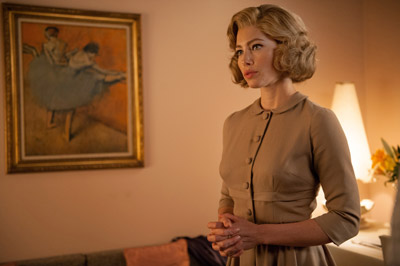 The full spectrum of that nature was perhaps best understood by Alma, who saw him when he wasn't sculpting a fluid, taut experience on movie sets but was deep down in the messier parts of life. "She was his steadfast ally through his life, and a very good writer and filmmaker herself," Anthony Hopkins observes. "He must have been a very tough guy to live with, but when you see them in photographs they look happy. I think he may have concealed his inner vulnerability from everyone except Alma."
The full spectrum of that nature was perhaps best understood by Alma, who saw him when he wasn't sculpting a fluid, taut experience on movie sets but was deep down in the messier parts of life. "She was his steadfast ally through his life, and a very good writer and filmmaker herself," Anthony Hopkins observes. "He must have been a very tough guy to live with, but when you see them in photographs they look happy. I think he may have concealed his inner vulnerability from everyone except Alma." He continues: "People often wonder: how intimate were they? Well, they probably weren't, but what they had was pure love and companionship. I think they must have had a lot of fun together, they must have had a lot of laughs, because he could be a real clown."
As for working with Helen Mirren as Alma, Anthony Hopkins comments: "She is a formidable performer, yet so easy to work with. Easy in all kinds of dimensions. She is skilled and savvy, knows what she wants, knows how to do it, and then makes it like a good game of tennis. Her portrayal of Alma is brisk and clear and warm. It really took me by surprise."
Sacha Gervasi also presented Hitchcock to Hopkins in a surprising light - as a film industry Goliath turned into a modern day David, determined to make a movie few believed could be a commercial success, let alone get past the Motion Picture Production Code Administration, the powerful censors who could quash any film that violated their strict rules governing sex and violence. "The resistance to Psycho made Hitchcock even more determined to succeed and in that way, this is also a kind of underdog story," says Sacha Gervasi. "Anthony Hopkins and I talked a lot in preparation about that theme. You have this contradiction of the king at the top of his game who is now the underdog, and Anthony had a lot of fun with that."
Alma
Alma Reville was a rising young film editor and cinema lover who married Hitchcock in 1926 and spent the next 54 years as his wife, confidante and silent collaborator. Unless it was critical, she never came to her husband's sets but played a key role throughout his career as a script editor, editorial consultant and perhaps the most keenly trusted opinion on each of his films.
In one of the best known stories of the pair's partnership, it was Alma who spotted Janet Leigh blink after she was presumably lying dead on the bathroom floor in a close-to-final cut of Psycho, sparking a quick re-edit just before the movie went out to preview.
While film historians and Hitchcock buffs have long been aware of Alma's major influence, she has never been widely known. With Hitchcock, Sacha Gervasi wanted to change all that so casting was absolutely critical. He was gratified to be able to cast one of the most compelling and award-winning actresses of our times - Helen Mirren, who won the Academy Award playing another obscured character: Queen Elizabeth in her private moments following the death of Princess Diana.
"Her fluidity with this character is just extraordinary," says Sacha Gervasi. "She's incredibly sharp but also very open. The Helen Mirren touch is just magic and it can't be properly explained or understood by a mere mortal like myself."
While the producers had been after Helen Mirren to play Alma for some time, it was not until she read the latest draft that she signed on. "What Sacha Gervasi did was to strike a tonal balance between the seriousness of the drama and the light kind of wit and comedy that is associated with Hitch. He brilliantly merged these two elements together," says Helen Mirren.
She says, she felt he had created a very original and unexpected kind of romance around a man few would think of as romantic and a woman about whom most people know little. "It is a love story," she states. "And I think that Alma and Hitch were, in their own funny, unglamorous way, a great kind of Romeo and Juliet partnership. They were amazing partners in life and I think they could teach us all something about how to make a successful marriage."
One thing that defined that marriage for Helen Mirren was their undying sense of humour. "Alma is always laughing - I think she found Alfred very funny. It's one of the things that kept them together, their shared sense of irony and the darkness of their humour, which is also very British," she notes.
She was also drawn to Alma's innate strength and self-belief. "Film buffs are well aware of the contributions Alma made to the creation of some of Hitch's masterworks - but I wanted to present on screen someone that the general public would believe had the ability to truly work side-by-side with this incredible filmmaker," says Helen Mirren.
In portraying Alma, Helen Mirren had little to go by; there is no surviving film footage depicting her mannerisms. But Helen Mirren intuited her own way into the character's skin. "I don't know what she walked like, I don't know how she used her hands. There was an awful lot of research that I couldn't do," she admits. "But I knew there were all these people trying to get to the great and glorious Alfred Hitchcock. And I knew what that feels like because that happened to me with my husband (director Taylor Hackford) when I first came here. I had a freedom with Alma to not attempt any kind of interpretation and really just let her be who she is in the story."
Sacha Gervasi was exhilarated by their immediate chemical reaction, which produced an instant depth to the relationship around which the entire film hinged. "When the two of them were together, the energy was just unbelievable," he describes. "They were so sweet with each other, yet so intelligent in their approaches. I was just glad to give them something so real and delicious to play."
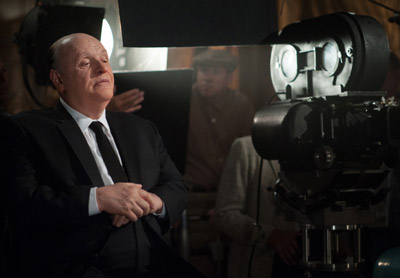 Helen Mirren and Anthony Hopkins had never worked together, despite coming from similar backgrounds and knowing many of the same people. "We both knew it was our destiny to someday work together but when this project came about, we were both of the mind, 'why did it take so long?'" muses Helen Mirren.
Helen Mirren and Anthony Hopkins had never worked together, despite coming from similar backgrounds and knowing many of the same people. "We both knew it was our destiny to someday work together but when this project came about, we were both of the mind, 'why did it take so long?'" muses Helen Mirren. Janet Leigh
Hitchcock's real life with Alma, full of everyday marital conflicts and the grit and dust of decades spent with one another, was of course very different from the passionate, provocative and often dangerous sex lives of the women who populate his films. Much has been made of the so-called "Hitchcock Blondes" - the director's roster of flaxen-haired leading ladies from Ingrid Bergman and Grace Kelly to Tippi Hedren and Kim Novak, who each had evinced an air of icy sophistication, clever confidence and impenetrable secrecy. They were some of the most daring, intelligent, irreverent and multi-dimensional female characters who had ever graced the movie screen - but they were also manipulative, untrustworthy and magnets for crime, psychopathy and danger.
There have been countless interpretations of Hitchcock's fascination with strong, sexually alluring but ineffably remote women in positions of jeopardy. Some have ascribed it, Freudian-style, to Hitchcock's repressed upbringing and bottled-up fantasies. Others see a complex engagement with issues of gender and feminist psychology- suggesting that Hitchcock was not exploiting the idea of the evasive blonde but rather exploring how powerful women are viewed by and must operate inside a society that feels threatened by them. Still others saw a more poetic illumination of life's insoluble contradictions. When Francois Truffaut interviewed Hitchcock he surmised of Hitchcock's obsession: "What intrigues you is the paradox between the inner fire and the cool surface."
Hitchcock acknowledges the director's reputation for not only casting a certain type of blonde powerhouse but also for inserting himself into their lives and psyches during his productions -- without either whitewashing it or simplifying it. Rather, the film hones in on a far more elemental relationship: his life-long loyalty to his non-blonde wife, Alma, around whom he had a very different kind of obsession, an obsession of creative ideas.
But certainly Psycho called for a consummately seductive blonde to take one of the most harrowing plunges Hitchcock ever asked of an actress. Taking the role was Janet Leigh, played in the film by Scarlett Johansson. Janet Leigh had spent the 1950s as one of Hollywood's most sought-after sirens, and was just coming off working with another masterful and authoritative director, Orson Welles, on Touch Of Evil. But playing Marion Crane in Psycho would become her signature role, garnering an Oscar® nomination and etching out an enduring place for her in popular culture as the quintessential pursued woman.
To play Janet Leigh, the filmmakers of Hitchcock went after an actress with a rare ability to move from the modern to the classic, Scarlett Johansson. "I've never met a woman of her age, who is that self-possessed, articulate, intelligent and understands her own persona," says Sacha Gervasi of Scarlett Johansson.
In researching the role, Scarlett Johansson says she became aware that Janet Leigh had a unique relationship with the director, one that broke his mold. "She was different in that she was married to Tony Curtis and she had three children, so she didn't quite fit that category of impossible to reach blonde. She truly was unavailable because she was a wife and a mother and was also a kind of funny, sexy, confidant broad who was able to have something more like a friendship with Hitchcock," she observes. "In the film, their professional relationship is an opportunity to see Hitchcock's more playful side, the side that was mischievous and childlike."
While Alma is skeptical of Janet Leigh as another potential object of infatuation for her husband, she ultimately comes to see that she is not a threat. "I think Alma has had enough of her husband putting his gorgeous leading ladies on a pedestal, and along with her own feelings of being ignored or undesired by him, that makes her react," says Scarlett Johansson. "But she's not reacting to Janet Leigh so much as to the feeling that this is the last straw and I'm not going to take it anymore."
Scarlett Johansson was quite taken with Alma as a character. "She believed in her husband's vision, but she also supported his vision and inspired him as a partner in every way. Their artistic collaboration became a kind of unbreakable foundation," she says. "I love that Hitchcock becomes a story about two artists in the autumn of their lives - and how they keep that love alive."
In preparing for the production, Scarlett Johansson spent time with Janet Leigh's daughter Jamie Lee Curtis, who gave her deeper insight. "Jamie Lee Curtis was so lovely and so supportive and you could tell a very proud daughter," she recalls. "She sent me beautiful family photographs and spoke so highly of her mother, as everyone does in the industry. From everything I heard and read about her, she was a very grounded, humble woman and a wonderful mom, first and foremost, which I think really informed me."
The highlight of it all was working with Anthony Hopkins as Hitchcock. "He has a truly remarkable presence -- almost like a lion on the prowl who finds just the right moment to pounce. It's incredible to feel that kind of energy coming at you. Hitch could not have been taken on by a lesser actor," she comments. "I think Anthony Hopkins has all the sweetness, the sadness and the intelligence that was required. It was all there on the page but to actually experience Tony as Hitch was a once in a lifetime thing."
Vera Miles
Another famous Hitchcock blonde also starred in Psycho - Vera Miles, who was under a 7-year contract with the filmmaker, and had starred in The Wrong Man and appeared regularly in his "Alfred Hitchcock Presents" TV series. Hitchcock was said to be enthralled with her - to the point that she had been cast to play the lead in Vertigo in 1957, but the director was unhappily forced to replace her with Kim Novak when Miles became pregnant before production. Two years later, Hitchcock cast her as Lila Crane, Janet Leigh's searching sister, in Psycho.
Taking the iconic role was Jessica Biel, who burst onto the scene in the romantic thriller The Illusionist. It was a live audition that won over Sacha Gervasi. "She blew everyone away. Her energy was so right - she was light and funny and human and she had tremendous pathos," he says. "It was a really well-rounded and captivating portrayal of Vera Miles."
Jessica Biel was thrilled to join the production. "Two things excited me: being in a cast which consists of pretty much everyone that I've hoped to work with and the fact that this takes place in such an interesting and curious moment of this film icon's life."
Then she became fascinated by Vera Miles's relationship with Hitchcock. "I think their relationship was a little bit tricky," she observes. "But they had massive respect for each other. She was a spitfire and a very independent woman. She worked tirelessly and she liked that he was the same way as a director. At the same time, I think Hitch was a little hurt when she chose to have a family so that rift is between them as Psycho begins production."
Jessica Biel saw Vera Miles as someone who was well aware of Hitchcock's propensity to be controlling and hard on his cast - and who knew what she was doing. "He always created very, very complicated women in his movies," she notes. "His women were for the most part not perfect women; they were dysfunctional, had psychological issues, some would go crazy. From my point of view as an actress, these are the roles you want to play and he continually created these roles in his career."
Working with Anthony Hopkins was especially exciting. "It was overwhelming, it was nerve wracking and it was utter jubilation," she laughs. "He's a powerful actor but he's also playful and he makes you feel comfortable enough to try anything, which made this film such a great experience for me."
Anthony Perkins.
Sacha Gervasi always suspected casting Anthony Perkins, the famously rangy, boyish actor who became indelibly associated with Norman Bates in Psycho - would be challenging. Then, out of the blue, the actor James D'Arcy called him up. "James D'Arcy is a friend of mine for years and I'd forgotten that, physically, he could be perfect for Anthony Perkins. He said, 'you're doing this Hitchcock thing, what about me?' He came in and gave the most mind-blowing audition," recalls Sacha Gervasi.
Executive producer Ali Bell concurs. "He simply knocked our socks off at the audition. He did such a great job of capturing the awkwardness of Anthony Perkins and showed us shadings to the character we hadn't even thought of."
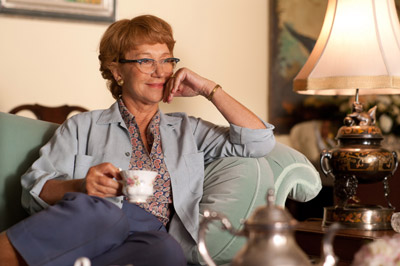 James D'Arcy, whose recent films include W.E., Cloud Atlas and The Philosophers, says that for Anthony Perkins, Psycho was a kind of gift he'd been waiting for his whole career. "I think it was a huge break for Anthony Perkins," he observes. "Actors were lining up to work with Hitchcock at this point. At the same time, the studios were trying to position Anthony Perkins as a kind of young James Dean which he didn't fit into terribly easily. He was more gangly and gawky and kind of childlike and he didn't have that sort of masculinity that Montgomery Clift or Brando and all those guys had and actually, I think ultimately, that was sort of the reason that we only really know him for Psycho - because he was never truly accepted by American audiences beyond Psycho"
James D'Arcy, whose recent films include W.E., Cloud Atlas and The Philosophers, says that for Anthony Perkins, Psycho was a kind of gift he'd been waiting for his whole career. "I think it was a huge break for Anthony Perkins," he observes. "Actors were lining up to work with Hitchcock at this point. At the same time, the studios were trying to position Anthony Perkins as a kind of young James Dean which he didn't fit into terribly easily. He was more gangly and gawky and kind of childlike and he didn't have that sort of masculinity that Montgomery Clift or Brando and all those guys had and actually, I think ultimately, that was sort of the reason that we only really know him for Psycho - because he was never truly accepted by American audiences beyond Psycho" He adds: "Now we're really used to the idea that the psychopathic murderer turns out to be the last person you'd expect, but when Psycho came out, the casting of Anthony Perkins was shocking."
The fact that not much is known about Anthony Perkins' life off screen also intrigued James D'Arcy. "Every character in this film has a secret side," he notes. "It's very Hitchcockian in that way."
Peggy Robertson
In addition to Alma, Alfred Hitchcock had another fiercely loyal woman in his life: his long-time right-hand woman Peggy Robertson. Peggy Robertson worked for the director for an incredible 30 years, served as a script supervisor, chief assistant and conducted much of the research for his movies. According to Psycho script supervisor Marshall Schlom, Hitchcock "could not do anything without her." Indeed, her meticulous notes on his productions would later be a major resource for historians.
Australian actress and Academy Award nominee Toni Collette (Little Miss Sunshine) takes on the role of the woman who made protecting Hitchcock's art, sometimes from himself, a priority. Right away, Toni Collette was compelled by Peggy Robertson's equal footing with the director. "I think Hitchcock knew she was astute, capable, stoic and probably what he appreciated most is that she didn't let him get away with anything and didn't bow down to him the way others did," she says. "The manipulation of his actresses and the complex life of balancing work and marriage with Alma was nothing Peggy Robertson had to, or would, put up with."
Toni Collette had also previously worked with Hopkins - in her very first film, the 1992 crime drama The Efficiency Expert. "It did feel like things coming full circle," she says. "I was 17 when I did my first film with him, and I couldn't believe I was going to have this experience again."
The excitement of working with Anthony Hopkins was soon equalled by her pleasure with watching Sacha Gervasi pull together all the elements of Hitchcock and Alma's story. "Sacha Gervasi's enthusiasm is infectious. The depth of his understanding was incredible, he'd done so much research, and then he created the most harmonious, pleasant set. But the film is very much like a Hitchcock film - it is layered, complex and has its own vision to it."
Ed Gein
In the revision of the original Hitchcock script, there was the addition of an unusual character: the infamously twisted killer Ed Gein - the real-life murderer who inspired the creation of Norman Bates in Psycho - who makes his presence known as an ink-black figment of Hitchcock's agitated imagination. For Sacha Gervasi the character's fantastical forays into Hitchcock's reality became a route into the hidden vein of psychological forces at work under the director's surface, the obsessive drives of his filmmaking and also his need to reconcile with Alma and have her see his humanity.
"Bringing in Ed Gein to me seemed to be a very fun, but potent way of articulating the battle that we all have with the darker side of ourselves," says Sacha Gervasi. "He could be Hitchcock's shadow, in a Jungian sense. It became an interesting way to dramatise Hitchcock's struggle with his own obsessions with murder, death, and his fear that he was as bad within as Ed Gein. Ultimately, there's a realisation that there's a central difference in the souls of these two men, but I loved trying to dramatise the fact that we always believe that we're much worse than we actually are."
Ed Gein was a particularly gruesome kind of madman in 1950s Wisconsin, who not only killed women, but exhumed corpses from the cemetery, fashioning keepsakes from their decayed bodies. His extreme urges and monstrous behaviour inspired Robert Bloch's depiction of Norman Bates, as well as spawning an ongoing fascination in popular culture with the mysteries of disturbed psychopaths. After all, Ed Gein was the very antithesis of shiny, happy suburban life in the 1950s - and more than one person was terrified that a grimly perverse Ed Gein might be lurking within a loved one . . . or themselves.
To play him with the just the right tone, Sacha Gervasi cast Michael Wincott, whose work has spanned stage and screen. "He's a brilliant actor who was able to channel the character's darkness and pain along with ultimately a kind of empathy," Sacha Gervasi says.
Michael Wincott knew he'd be diving into a murky realm where dreams, fears and the most deeply hidden emotions meet, but he also saw Ed Gein's relationship with Hitchcock in the film as turning into something positive. "While the scenes of Ed Gein certainly are dark, ironically I think there is also something illuminated by his presence," Michael Wincott observes.
Whitfield Cook
While Alfred Hitchcock throws himself into Psycho, Alma searches for a creative connection elsewhere, reworking a screenplay by writer Whitfield Cook, who most famously wrote the adaptation of Hitchcock's Strangers On A Train. In real life, Whifield Cook was known to have collaborated closely with Alma, and on her death said of her: "Alma was truly a filmmaker. I can sincerely say from personal experience that I don't think Hitch's films would have been as good without Alma."
Playing Cook is Danny Huston, whose films include The Aviator, The Constant Gardener and Children of Men - and who grew up the son of a master director himself. That gave him a certain insight into the gap between the public and private lives of celebrities. "Hitchcock was a legend, and like a lot of legendary humans of this ilk, I think he had a great ability to play into his own mythology. You see that with Orson Welles, the way he behaved, and certainly with my father, John Huston, where people thought of him as being a man who was more interested in going out for a hunt rather than making his films - and he did nothing to dispel that. He loved it and Hitchcock, I think, had that same ability to encourage the view that we have of him," Danny Huston says.
Danny Huston sees Whitfield Cook as a kind of Hitchcockian character, who gets wrapped up in more than he bargains for when he decides to write with Alma. "He suddenly becomes embroiled in this tender relationship. He needs Alma, in much the same way Hitchcock needed her, to lift his material. He is using her out of innocent ambition and he's a flirt, but when they are creative together, a certain spark happens and I think it surprises both of them," he explains. "And that fuels Hitchcock's jealousy."
As for what fuelled his performance, he cites Helen Mirren as his inspiration on the set. "She has no pretense, so it is just pure joy to work with her," he summarises.
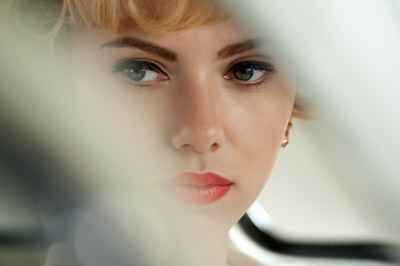
MORE



